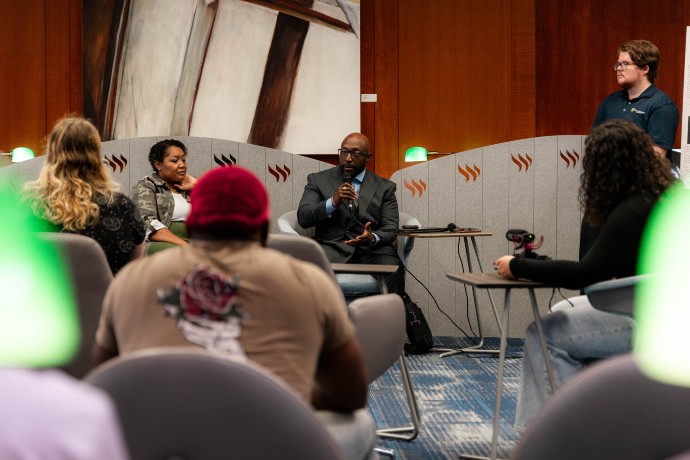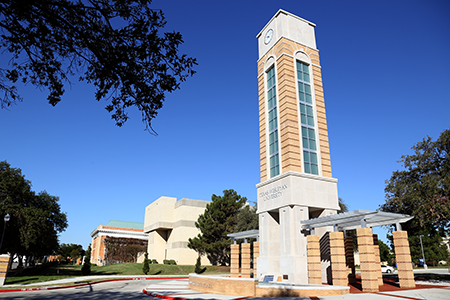Can Art and Activism Shape History? Rouse and Willis-Beard Showed Texas Wesleyan

Texas Wesleyan University launched its month-long Black History Month celebration on Tuesday, Feb. 4, with a powerful and moving presentation by Fred Rouse III and Janae Willis-Beard. Rouse III, President of the Tarrant County Coalition for Peace and Justice (TCCPJ) and board member of Transform1012, and Willis-Beard, managing director of Jubilee Theatre, shared their unique perspectives and deeply personal stories with the campus community.
Fred Rouse III's story is inextricably linked to a tragic chapter in Fort Worth's history. He is the grandson of Mr. Fred Rouse, a Black, non-union butcher for Swift & Company in the Niles City Stockyards (now Fort Worth) who was lynched on Dec. 11, 1921. Mr. Rouse was brutally attacked by striking workers and agitators on Dec. 6, 1921, after leaving work. A mob beat him with a streetcar guardrail, leaving him for dead on Exchange Avenue. Niles City police officers retrieved Mr. Rouse, who was still alive, and was taken to the segregated ward of the City & County Hospital.
Five days later, at 11 p.m. on Sunday, Dec. 11, 1921, a mob stormed the hospital, abducted Mr. Rouse, and drove him to the "Death Tree" at NE 12th Street and Samuels Avenue. There, they lynched him, riddling his body with bullets in what remains the only documented lynching of an African American in Fort Worth.
Rouse III only learned of his grandfather’s history five years ago. “That is why it’s important that we share our history,” he said. “I wouldn’t be here today, speaking to all of you, if it wasn’t for that phone call I received telling me about my grandfather.”
Now, as President of TCCPJ, Rouse III is working to create The Mr. Fred Rouse Memorial at the corner of NE 12th Street and Samuels Avenue.
The story also connects to his cousin, Robert Rouse, whom Fred Rouse III only recently met. Robert Rouse worked at the Jubilee Theatre, the original home of African American theater in North Texas. “He was what we called an ‘OG,’” Willis-Beard laughed. “The crowd would [swoon] for him.”
Jubilee Theatre's history is rich and resilient. Initially a "gypsy theatre," the Jubilee Players performed in various venues across the city, including lobbies, saloons, the former Caravan of Dreams, Stage West and Pocket Sandwich Theater. Today, the theatre resides in Sundance Square, less than two miles from where Mr. Rouse was lynched. “Our history is in that space,” Willis-Beard said.
Willis-Beard expressed her desire to produce a play about Mr. Rouse’s story, ensuring its accuracy and collaborating with the family. “We have a mission and vision to give a voice and a stage to the African American story,” Willis-Beard said.
Looking to the future, both Rouse III and Willis-Beard shared their visions for community growth. Rouse III described his work with Transform1012, transforming a former Ku Klux Klan building into a place for the community to come together. Willis-Beard highlighted Jubilee Theatre's efforts to engage younger generations through a junior board and college nights.
Both organizations actively seek volunteers from the college and wider community. As Willis-Beard and Rouse III emphasized, volunteering and community involvement provide valuable experience in budgeting, project management, teamwork and other skills highly valued by future employers.








